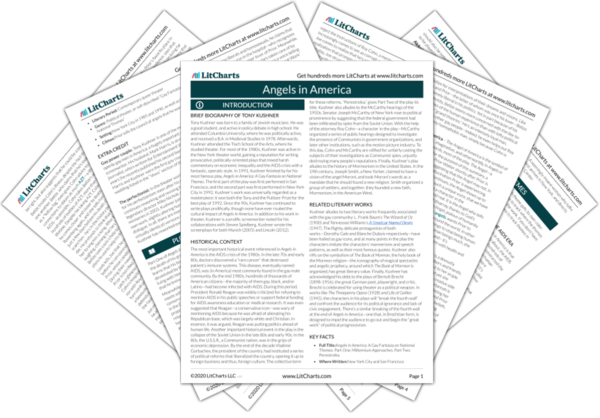Angels are among the most explicit and evocative symbols in Kushner’s play. To begin with, it’s important to note that angels are hermaphrodites, neither male nor female. This is important because Kushner’s play centers around questions of sexual identity: just as many of the play’s characters waver between homosexual and heterosexual behaviors (and masculine and feminine personae), the angels exemplify the ambiguity in all sexual identity. But paradoxically, in representing a kind of “ideal humanity” (neither masculine nor feminine, neither gay nor straight), the angels also come to symbolize the absence of genuine humanity. Angels are immortal, have glorious orgasms, etc., and yet Kushner’s angels are also bored, joyless, and—most importantly—incapable of making free decisions. The angels’ very perfection renders their lives dull—only human beings themselves can experience the joy of uncertainty. It’s also important to keep in mind that the angels in the play might be completely imaginary—the product of Prior Martin’s feverish imagination. In this way, we might say that angels symbolize humanity’s potential to be perfect—to imagine or aspire to perfection—and yet they also end up symbolizing the futility (and undesirability) of actually realizing that potential.
Angels Quotes in Angels in America
There are no gods here, no ghosts and spirits in America, there are no angels in America, no spiritual past, no racial past, there’s only the political, and the decoys and the ploys to maneuver around the inescapable battle of politics…
Greetings Prophet;
The Great Work begins:
The Messenger has arrived.
Bored with His Angels, Bewitched by Humanity, In Mortifying imitation of You, his least creation, He would sail off on Voyages, no knowing where.
It wasn't a dream. [...] I think it really happened. I'm a prophet.
If [God] ever did come back, if He ever dared to show His face, or his Glyph or whatever in the Garden again. If after all this destruction, if after all the terrible days of this terrible century, He returned to see... how much suffering His abandonment had created, if all He has to offer is death, you should sue the bastard. [...] Sue the bastard for walking out. How dare He.












